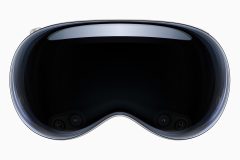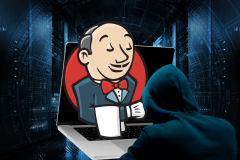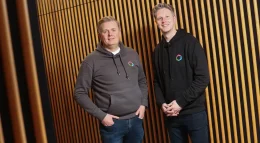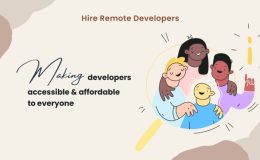A Nod To Developers
Before getting into the nuts and bolts of the AppUp strategy, Scott Apeland takes time time to recognize the great work from our developers. AppUp Black Belts were introduced during the start of this portion of the keynote with our good friend Suresh Kumar of Blue Innovation getting recognized for his enthusiasm of development and his Blue Birds apps. Scott also mentioned the hackathon and how this year we took it mobile with a 36 hour bus ride of developers, coding apps. So congrats and thanks to the tireless work of those dedicated developers.
Three Ways to Realize the Compute Continuum
Tizen, Ultrabooks and HTML5 were explained as key efforts to expand development for across the compute continuum
Tizen is a new open source project from the Linux Foundation, combining the best of MeeGo and LiMo. Tizen as Scott explains is a truly standards based, open source, cross device software platform. Like MeeGo, Tizen will support smartphones, tablets, & smart tvs & in vehicle systems. Tizen is hosted by Linux foundation with Intel and Samsung as co-chairs and managed with an open governance structure. Tizen to be available in Q1 2012 and products mid year 2012. With Tizen you get the same community based contributions as we’ve seen with MeeGo, and the advantage of carrier support from the LiMo foundation. Additionally Tizen supports HTML5 & WAC development standards allowing Tizen developers to leverage their software more widely across devices and platforms. Netbook apps on MeeGo will move to Netbook version of Tizen without any porting needed. For smartphone and tablets, Scott suggests starting with HTML5 development. The AppUp developer program will provide more information such as tools and guides for Tizen
Ultrabooks are the next big thing for app developers. Scott explains an existing chunk of the AppUp user base are laptop users and the largest portion of the compute continuum with 1 Million PC’s ship per day. This is a HUGE market and Scott said Intel expects 40% of PC shipments to be Ultrabooks next year. Ultrabooks coming immediately will be super slim, near instant on, great battery life making mobile computing a great creative and productive experience. Next year more mobile like capabilities such as touch & sensors will be available on Ultrabooks, making Ultrabooks a best of both world scenario. And if you are interested in helping Intel get Ultrabooks going, there’s a $300 million fund available to businesses who have technologies, applications, etc that will span across the compute continuum
Scott spent some time discussing the advantages of HTML5. HTML5 as we all know is being adopted by most major platforms and application stores. The key value is it allows developers to leverage their development investment across devices. For AppUp this is allows us to have a common development framework for both Tizen & Ultrabooks. AppUp is taking the first step having been rewritten in HTML5. Scott explains HTML5 is not limited to a browser experience and there can be a hybrid approach that runs local and can be written to take advantage of device specific hardware.
AppUp tools and service supporting HTML5 include AppUp Encapsulator, allowing HTML5 to be packaged for Windows & and MeeGo, and will support Ultrabook and Tizen as well. Additionally we announced AppUp Creator, which allows non-developers to easily create their own application, which is built in HTML5
Community Reaction
Over the few days I got to talk to our developer community about the above. The Ultrabook strategy appears to be the most exciting however with a clear caveat that AppUp must ship with Ultrabooks. This was recognized by Intel execs during the fireside chat, and was emphasized in the closing keynote that AppUp shipping on Ultrabooks is a must. Peter Biddle set the bar with a goal of 6 Million users next year creating the pressure needed to ensure AppUp ships on devices
Tizen was seen as an interesting move forward, and there seems to be some careful choice of words between MeeGo evolving to, being combined for, or being end of lifed for Tizen. But all seem to recognize the spirit of MeeGo continues with Tizen with open governance and platform to span the compute continuum, but with new APIs and a more broadly adopted set of standards. I heard some comfort in knowing all the same folks are in place from the Intel and Linux Foundation side, with an expectation to work and contribute with Tizen as with MeeGo.
HTML5 has been received somewhere between ecstatic excitement to an hesitant understanding. But when probing deeper the idea of a development language one layer extracted from native development to achieve cross platform support is widely understood an accepted (i.e. Java, AIR, etc). All agree it the future and it makes sense to move early than late. Per HTML5 the nagging questions were, where are the mature tools and show me well known HTML5 apps and I’ll then invest people in it. Also what is not yet know is to what degree a hybrid HTML5 approach will allow you to develop apps that act more like native apps. Most agree, that needs to be the goal, and with that they are excited to see the Tizen SDK and next revs of Encapsulator.
So, now we start an exciting new journey that will play out in 2012. Stay tuned here for more information on our support for Tizen, Ultrabooks and HTML5 and if you want to earn reputation and achieve Black Belt status, just start engaging here and we’ll take note
Source AppUp Developer


















